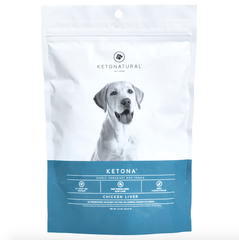Save Money, Save Your Dog.
Join Our Email List For Discounted Pricing and a Free Guide to the Science of Keto Dog Food.
If you're reading this post then I'll suppose you have at least a passing interest in the carbohydrate content of your dog's food. Maybe it's because your dog has diabetes, maybe it's because you want to feed her a diet that's consistent with her evolutionary heritage, or maybe you're just worried about obesity. But you're reading a blog post written by the founder of a company called KetoNatural Pet Foods, so carbs are probably on your radar.
If they are, you already know that you're in something of a difficult spot. Because, incredibly, under the regulatory framework currently governing the sale of pet food in the United States, pet food companies do not have to disclose the carbohydrate contents of their products.
How did this absurd reality come to pass? Well, unlike fats, proteins, and all manner of vitamins and minerals, carbohydrates aren't "essential" nutrients for dogs and cats. So carbs weren't the focus way back when the relevant labeling regulations were originally written.
In the decades that followed, however, scientific experimentation gradually revealed the unhealthful consequences of chronic carbohydrate consumption. And as it did it became increasingly difficult to justify the fact that pet food brands could simply hide the carbohydrate contents of their products from consumers. But that didn't matter too much, because it was good for business. After all, carbs are the cheapest source of calories, so pet food brands have a profit-based motivation to use them as copiously as they can get away with.
Real, serious regulation would have changed the situation ages ago. (Carbs aren't "essential" nutrients for people either, but the FDA began requiring carbohydrate disclosures on human-use packaged foods way back in 1993.) But AAFCO, the private group that regulates the labeling of pet food in the US, is not a real or serious regulator. It's an industry front group. So carbohydrate disclosures weren't required. Quite to the contrary, "hide the carbs" became a central tenet of mainstream pet food marketing.
Fortunately for the health of America's dogs and cats, all that is (finally) about to change.
After years of resisting the lobbying efforts of consumer- and pet-focused folks like myself, AAFCO has finally seen the light. Last week, at its annual conference, the organization announced the most significant changes to its nutritional labeling rules in its history. And these include replacing the antiquated "Guaranteed Analysis" panel with the following "Pet Nutrition Facts" panel.

(Image from AAFCO's latest proposed model rules, available here.)
As you can see, complete carbohydrate disclosures will now be required. Brands will even have to provide more granular information about the type of carbs in their products -- sugar, starch, fiber, etc.
This is an absolutely huge improvement. And I predict it'll create some very surprised pet owners, while also having a materially positive impact on the average lifespan of American dogs and cats.
Now, don't expect this to happen overnight. At the moment, the new rules are still in a commentary phase. And according to AAFCO's own timeline, they won't even be officially adopted until at least the end of the calendar year. Consumers won't start seeing the new panels for at least another year or two after that (AAFCO typically gives brands a generously long time to revamp packaging in response to new regulations). Until then, you'll need to continue asking your preferred brand directly about their carbohydrate contents or doing calculator work on Guaranteed Analysis data.
(Unless, of course, you're a KetoNatural customer. We've been voluntarily disclosing the carbohydrate contents of our products since our inception.)
In any case, it's a welcome change and a long-overdue step in the right direction. It's a good day for pet food.


Related Articles
How Much Does The Farmer’s Dog Really Cost?
5 Signs and Symptoms That Your Dog May Have Diabetes
Learning to Take Pleasure In Being Your Dog's Play Buddy-Drill Sargeant
Dogs, Dog Food and Dogma - A Book About America's Pet Obesity Epidemic
Browse Articles By Category